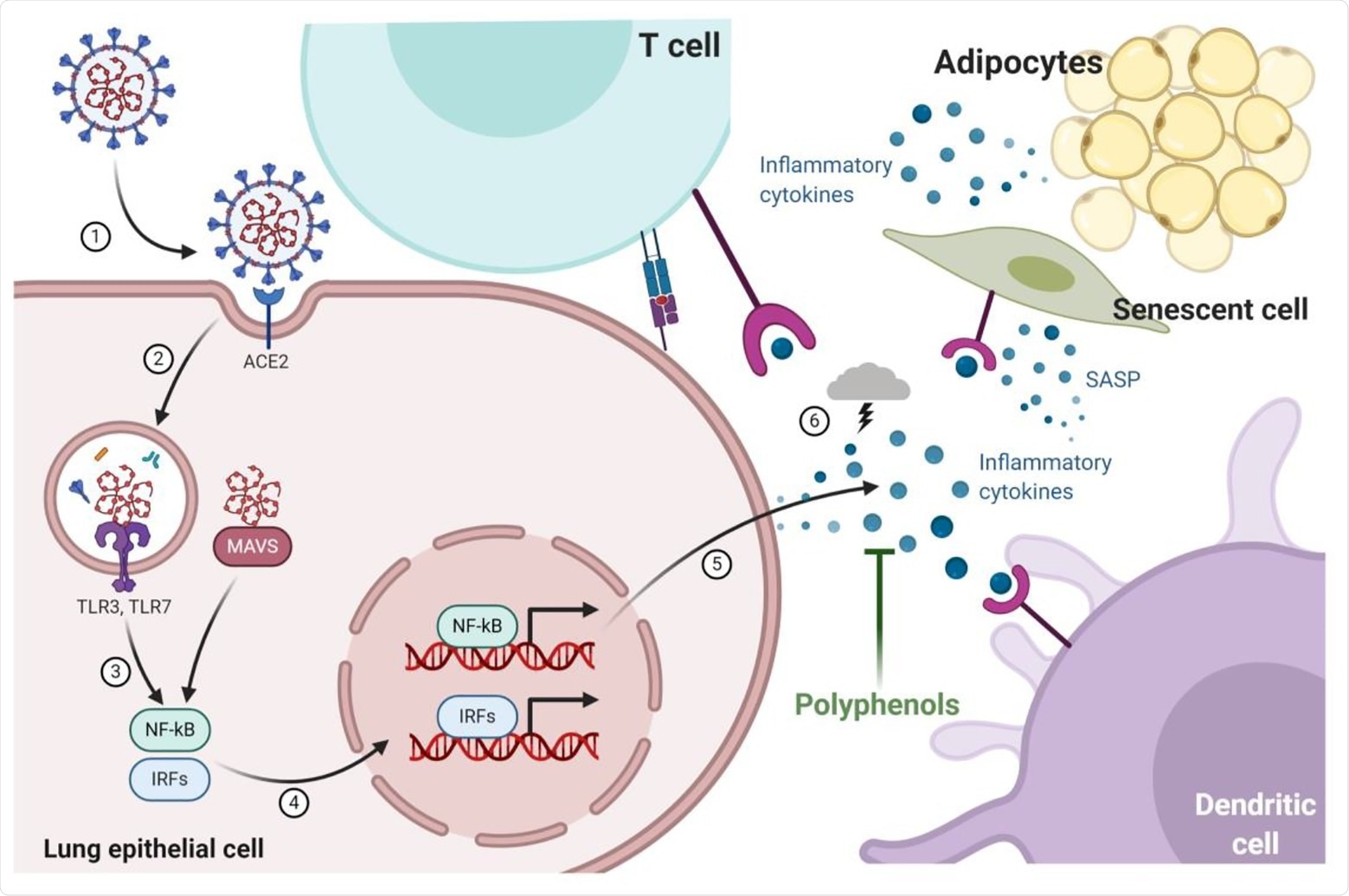Age is undoubtedly the most critical risk factor for death in COVID-19 patients. Also, the severity of COVID-19 is associated with several other comorbidities. Although around 80% of confirmed SARS-CoV-2 positive cases exhibit mild symptoms or no symptoms at all, the remaining 20% of patients may develop severe symptoms, potentially leading to death.
Therefore, a better knowledge of SARS-CoV-2 infection in inflammatory-associated high-risk populations is essential to develop the therapies needed to combat or prevent severe COVID-19.
Researchers at the Josep Carreras Leukaemia Research Institute (IJC), Badalona, Spain, Sao Francisco University, Bragança Paulista, Brazil, and the Pontifical Catholic University of Campinas (PUCCAMP), Campinas, Brazil, reviewed the pathogenesis and clinical implications of inflammatory disorders related to senescence in COVID-19 patients.
In the study published in the journal Integrative Physiology, the researchers found that a high intake of polyphenols may have a protective effect on patients with COVID-19 and prevent disease progression.
Cytokine storm
COVID-19 is characterized by a cytokine storm, systemic inflammation, and acute respiratory distress syndrome (ARDS), leading to potentially fatal complications.
Older adults and people who are obese are more likely to develop an enhanced inflammatory status if they get infected with SARS-CoV-2. These individuals represent a high-risk for rapidly progressive clinical deterioration.
Further, these individuals present comorbid disorders and immunosenescence, which is the gradual deterioration of the immune system as people age. It involves the body's capacity to respond and sustain the long-term immune memory acquired by infection or vaccination.
As a result, aged and obese individuals may experience a viral-induced cytokine storm, including the expression of molecules acting as virus receptor as angiotensin-converting enzyme 2 (ACE2) and dipeptidyl-peptidase 4 (CD26). The cytokine storm can lead to respiratory failure and an increased risk of mortality.

Infection of pulmonary epithelial cells occurs through the interaction of the spike glycoprotein envelope (S-protein) with the angiotensin I converting enzyme (ACE)-2 receptor that allows viral replication and triggers mechanisms to combat infection by the host cells thought toll-like receptors (TLRs) and mitochondrial antiviral-signaling protein (MAVS). Cytokines pro-inflammatory are produced by nuclear factor kappa -B (NF-kB) and interferon-regulatory factors (IRFs) signaling pathways recruiting more immune cells (dendritic cell and T-cell) to lungs. Recruited immune cells increased cytokine production resulting in a cytokine storm that is associated with a worse prognosis of infected patients. During aging and obesity, the production of pro-inflammatory cytokines and the establishment of low-grade systemic inflammation are also observed. The expression of components of the renin-angiotensin-aldosterone system, such as ACE2, is also modified by aging and obesity, which could explain why elderly and obese patients are affected and headed the death statistics by COVID-19. Dietary bioactive substances such as polyphenols are able to block the production of cytokines by senescent cells (senescence-associated secretory phenotype; SASP) and adipocytes, as well as modify the ACE-1/ACE-2 ratio, which can potentially result in beneficial effects in COVID-19.
Polyphenols prevent inflammatory comorbidities
Polyphenols are dietary components that help prevent inflammatory comorbidities. They are a category of compounds naturally found in foods like herbs, fruits, vegetables, wine, dark chocolate, and tea.
Polyphenols help reduce inflammation, which is the culprit of many chronic diseases such as heart disease, hypertension, and diabetes.
Past studies have shown that polyphenols can help manage blood pressure levels and keep the blood vessels healthy and flexible. Apart from blood sugar and blood pressure, polyphenols can reduce chronic inflammation.
Apples, chocolate, red wine, olive oil, and turmeric are some of the food and beverages that are high in polyphenols.
The current study shows that since polyphenols reduce inflammation, they could help combat COVID-19. Polyphenols might help protect the body from the harmful effects of the disease.
The researchers noted that "inflammaged patients" or those with chronic inflammation are vulnerable to adverse clinical outcomes when sick with COVID-19. They emphasize that evidence point to the benefits of polyphenols for senescence and inflammation prevention. Therefore, the compounds can be used for treating SARS-CoV-2 infection and prevent disease progression.
"It is hoped that the clinical studies under development can add valuable information about this hypothesis and help reduce suffering and mortality imposed by SARS-CoV-2 infection," the researchers wrote in the paper.
"A better knowledge of SARS-CoV-2 infection in inflammatory-associated high-risk population is essential to develop the therapies needed to combat or prevent severe COVID-19," they added.
COVID-19 global toll
To date, 192 countries and territories have reported cases of COVID-19. Of the more than 111 million cases, over 62.8 million people have recovered.
The United States remains the country with the highest number of cases, with over 28.1 million cases and nearly 500,000 deaths.
Source:
Journal reference: